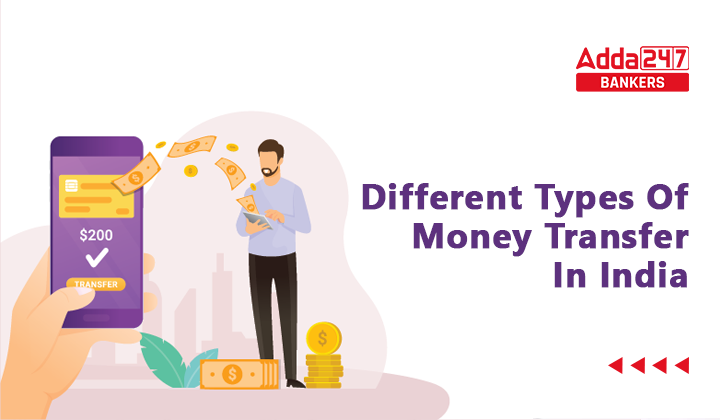Different Types Of Money Transfer In India
Banking Awareness is an important topic for banking aspirants as it will be helpful to them not only in cracking the General awareness section but also in qualifying for the interview. If you are a candidate preparing for bank exams then it is expected to have at least the basic terms related to banking crystal clear and that is why most of the questions asked in the interview are related to banking awareness terms which most of the candidates fail to answer. We have tried in this post to cater the best and updated study notes related to Different money transfer system in India to make sure that aspirants only study from the relevant source
Different Types Of Money Transfer In India: Introduction
Different Types Of Money Transfer In India is a general awareness topic as it plays an important role in our daily life. In the given article, we have shed light on the common means through which people can transfer money to one another. Aspirants preparing for banking examinations can expect questions from the given topic.
NPCI
National Payments Corporation of India (NPCI) is an umbrella organization in India for all retail payments system in India. With the guidance and support of the Reserve Bank of India (RBI) and Indian Banks’ Association (IBA) it was set up. Once the Board for Regulation and Supervision of Payment and Settlement Systems in 2005 was established, the RBI released a vision document incorporating a proposal to set up an umbrella institution for all the retail payment systems in the country. The core objective of this organization was to consolidate and integrate the multiple systems with varying service levels into nation-wide uniform and standard business process for all retail payment systems. The other objective of this organization was to facilitate an affordable payment mechanism to benefit the common man across the country and help financial inclusion. In this article we will discussing some of the products under NPCI which helps the citizens in money transfer.
Different Types Of Money Transfer In India
In India, there are several methods available for individuals and businesses to transfer money, both within the country and internationally. These methods facilitate the movement of funds between different bank accounts. Different Types Of Money Transfer In India include the following:
National Electronic Fund Transfer (NEFT)
NEFT is a popular electronic funds transfer system in India that enables one-to-one transfers of funds between bank accounts. Unlike RTGS, NEFT operates in batches and settles transactions periodically throughout the day. NEFT transfers are commonly used for lower-value transactions and are subject to a maximum transfer limit set by the banks.
- Minimum amount – No lower limit for transferring money through NEFT.
- Maximum amount – No upper limit for transferring money through NEFT.
Real Time Gross Settlement (RTGS)
RTGS is a system designed for high-value interbank money transfers in India. It allows for instant and real-time transfer of funds on a gross basis. RTGS is typically employed for large-value transactions, and there is usually a minimum transfer limit set by the banks.
- Minimum amount – Rs 2,00,000
- Maximum amount – No limit
Inter Mobile Payment Service (IMPS)
IMPS is an instant interbank electronic funds transfer system that enables 24/7 fund transfers in India. It allows individuals to transfer money instantly using mobile phones, internet banking, or ATMs. IMPS transfers can be conducted using the recipient’s mobile number and an Indian Financial System Code (IFSC), or through mobile payment apps.
- Minimum amount – Rs 1
- Maximum amount – Banks can set their own limit for IMPS as they seem suitable.
- Time limit – It is based on real time. The depositor account is credited in less than 1 minute from the submission of transaction.
- Availability – It can be done 24X7 even on bank holidays, RBI holiday and Sunday
UPI (Unified Payments Interface)
UPI is a real-time payment system in India that facilitates instant fund transfers between bank accounts using a mobile platform. UPI provides a seamless experience for transferring money by leveraging mobile numbers, virtual payment addresses, or scanning QR codes. It has gained significant popularity due to its simplicity and widespread adoption by various banks and payment apps.
- Minimum Amount: One Rupee
- Maximum Amount: One lakh
- Time Limit: 24*7 hours
- Availability: 365 days





 GA Capsule for SBI Clerk Mains 2025, Dow...
GA Capsule for SBI Clerk Mains 2025, Dow...
 The Hindu Review October 2022: Download ...
The Hindu Review October 2022: Download ...
 IB ACIO 2025 Notification PDF Out for 37...
IB ACIO 2025 Notification PDF Out for 37...


